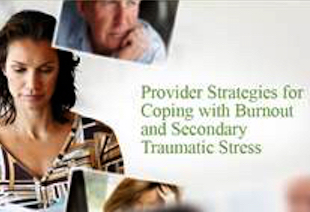PTSD: National Center for PTSD
Provider Strategies for Coping with Burnout and Secondary Traumatic Stress
Continuing Education
This section brings together free in-depth Continuing Education resources for the Professional community concerned with trauma.
Provider Strategies for Coping with Burnout and Secondary Traumatic Stress
- Date Created: 08/26/2016
- Time to Complete: 1 hour
- Credits: ANCC, APA, ASWB, ACCME, NBCC, Other Orgs
- Skill Level: Basic
 Author(s):
Author(s):
Description
This course reviews the research on burnout and secondary traumatic stress (STS). Users can assess their own levels of burnout and STS before learning about a variety of coping strategies for offsetting the effects of each. This course provides clinician-informed information.
Features include interactive exercises, clinical vignettes, handouts for easy reference, and tips on knowing when and how to seek help.
- Define burnout and secondary traumatic stress, in addition to related terms (e.g., compassion fatigue), and differentiate these from general stress.
- Identify at least two personally held values related to working with PTSD patients.
- Regall two to four brief intervention strategies, including behavioral and psychological strategies.
- Summarize practical implementation strategies (e.g., reminders).


























